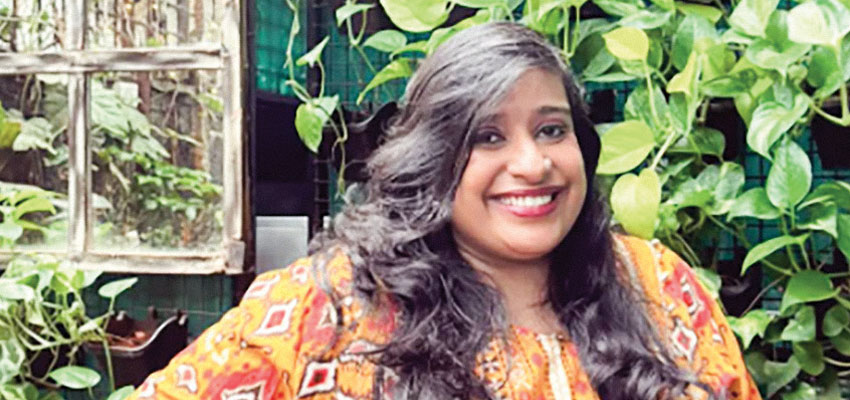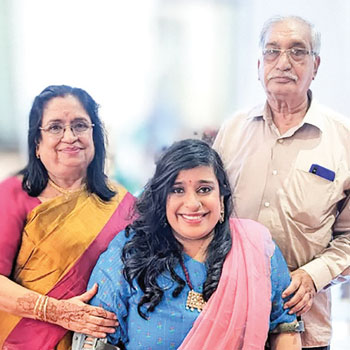Comedy with a deeper purpose

Think of stand-up comedy or open mics and the first thing that comes to our mind is a humourous or light hearted entertainment show. However, for Sweta Mantri, a physically challenged stand up comedian, it is a platform to challenge the stereotypes prevailing in society on disability. Conferred with the Rex Karmaveer Chakra Award, a global civilian honour, she has proved that laughter can be revolutionary. This is her story of unfiltered humour on disability, which she exhibits seamlessly
During an open mic show, an audience member approached Sweta and said, “Your jokes were funny, but they were on awkward topics. So, I didn't know if I should laugh or not.” That is where Sweta's thoughts on inclusive comedy validated that if jokes about disability are making people uncomfortable, then it’s high time to change the perception of society towards physically challenged people. Now she uses humour as a tool to reach a maximum audience and convey her message.
Inclusive comedy
Born with Spina bifida, a condition that prevents her spinal cord from fully developing, Sweta spent years advocating for differently abled through her write-ups and social awareness campaigns. However, joining open mic shows amplified her work. It was in 2016, while watching some of her favourite stand-up comics, she observed that her naturally sarcastic tone was a perfect fit for stand-up comedy.
She says, “My tone as an activist is too harsh. And, that's when I was also simultaneously watching standup comedians raising their voices on societal issues through humour, which made me think that even I can use my witty tone to advocate for differently abled.”
This thought struck Sweta so much so that she ventured into stand-up comedy to see how people take this tone of conversation—the combination of disability advocacy and comedy. “However, I realised that being witty in a regular conversation is very different from actually working on a set up, a punchline and a joke format. I learned the craft well, and then I delivered better,” she said. The negative comment triggered her to explore a different manner of communication. Eventually, with practice, she aced the humour.
Finding her voice on stage
Presenting her thoughts on open mic and in front of a crowd was quite daunting for Sweta. Because open mic, like other fields, was not easily accessible for the physically challenged people. During her initial days as a comedian, she was even told that she was an ‘angry comic’— articulating everything unfiltered, making people uncomfortable to learn about disability.
She avers, “Like any other new comedian, I lacked an understanding of the craft. A bunch of people told me that I do come across as an intense comic. However, even if it may feel okay for some, I felt that my disability and belonging to a minority community made it difficult for me to be accepted as a comedian.
Eventually, with each performance, Sweta changed her approach to presenting disability inclusive issues. She learned to convey her jokes in a better manner—starting with lighter jokes, delivering the right punchline, and then ending with the intense stuff.
“Since the beginning, I was clear that I would only talk about physically challenged people and their place in society. So, I worked on refining my comedy,” says Sweta.
"Some people think that physically challenged individuals can’t do certain things, but that’s not true. We can—only our way of doing is different. If we are also given the right access tools that are designed as per our needs, we'll be able to do the same tasks"
-Sweta Mantri

Unfiltered and unapologetic
Little did Sweta know that another challenge was waiting for her. The audience used to find her punch-up comedy too real to laugh at—the sharp and observational jokes. “When people used to see me with crutches, they used to have their own understanding of me, and then they would pull back. If a guy jokes about the system, people laugh as he fits in the structure of the society. But, if less privileged is actually mocking the system or the society, it’s too raw, too real,” she explains.
Thus, it took Sweta time to observe and joke about disability. “I learned to break the ice with the audience and tell them that I am going to say what I want to say. I'm not going to change what I want to say, because you are uncomfortable,” she adds.
As a writer, campaigner and podcaster, Sweta’s initiatives, like Give Some Space and The Restroom Project, address accessibility issues for physically challenged people in urban spaces. For 15 years, she has been religiously addressing issues like inaccessible public infrastructure, the lack of proper restrooms for differently abled people, and the daily challenges of finding space in a world that isn’t built for them. However, with YouTube and open mic, she is able to raise her voice in an effective manner.
Over the seven years, Sweta has performed in around 300 stand-up comedy shows and open mics together. “I've been a writer most of my life, so I'm very comfortable being behind the screen and writing my feelings out. I still remember my first open mic show. After seeing their responses, I think people and the comedians had probably not heard the disabled's narrative in such an unfiltered manner before,” she grins.
The act of rebellion
For Sweta, her journey into stand-up comedy was not just about reclaiming space but was an act of defiance. Through her humour, she fights with the ‘normalised’ standards of society and voices the need to equally accommodate physically challenged people in society. “Stand-up comedy requires you to step out of home and do your work. But, when you think about physically challenged, society assumes that they should not be outside or that they cannot be out of the home. The truth is, society hasn't given us the right access tools to be outside. So, my needs are not normalised, and that's why I don't have the right kind of access tool,” she explains. She further adds, “I just want to tell the society that I will be here, I want to be here, and I want to reclaim my space.”
Sweta also questioned the capitalist approach of the society. “We are of value only if we do something or if we contribute to something. Why can't we be worthy only by the virtue of existence? Why do we have to do something to prove our worthiness to people?,” she asks.
Bringing the change
As Sweta says, her efforts have also inspired change within the comedy industry. Some comedy show producers, after hearing about her experiences, started making their venues more accessible. “A few comedians who also host open mics, approached me to understand how they could make their shows more inclusive. It was a small step, but it showed that people are willing to change if they know how,” she said.
With a lack of the right access tools for the physically challenged, Sweta says that the road to inclusivity is long. “Some people think that physically challenged individuals can’t do certain things, but that’s not true. We can—only our way of doing is different. If we are also given the right access tools that are designed as per our needs, we'll be able to do the same tasks,” she asserts.
Pushing boundaries
Comedians like Anshita Koul, motivate Sweta to push boundaries in the stand-up comedy for social change. And, she always had her parents as her pillar of support throughout her work, be it writing, campaigning or comedy. “They never set limits on what I could or couldn’t do, but they just let me do my thing,” she reflects.
With every joke, every punchline, and every performance, she is making people think, question and change. “You should be willing to unlearn. In my journey, I've had to unlearn my own understanding of the audience. Wherever you are, you are going to go with certain preconceived notions; you have to be willing to unlearn them because doing a job hands-on is going to teach you a bunch of things,” she concludes.